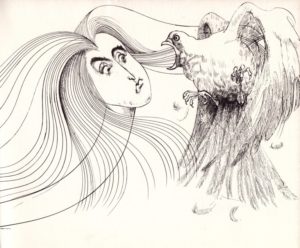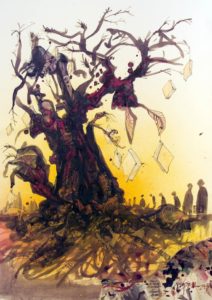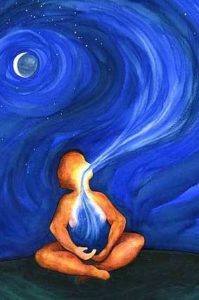On Dialogue
February 24, 2017[Ralph Steadman art]
In spite of this worldwide system of linkages, there is, at this very moment, a general feeling that communication is breaking down everywhere, on an unparalleled scale…what appears [in the media] is generally at best a collection of trivial and almost unrelated fragments, while at worst, it can often be a really harmful source of confusion and misinformation.
He terms this “the problem of communication” and writes:
Different groups … are not actually able to listen to each other. As a result, the very attempt to improve communication leads frequently to yet more confusion, and the consequent sense of frustration inclines people ever further toward aggression a and violence, rather than toward mutual understanding and trust.
More from Maria Papova/brainpickings and David Bohm:
“It is clear that if we are to live in harmony with ourselves and with nature, we need to be able to communicate freely in a creative movement in which no one permanently holds to or otherwise defends his own ideas.
Language is collective. Most of our basic assumptions come from our society, including all our assumptions about how society works, about what sort of person we are supposed to be, and about relationships, institutions, and so on. Therefore we need to pay attention to thought both individually and collectively.
“Dialogue” comes from the Greek word dialogos. Logos means “the word,” or in our case we would think of the “meaning of the word.” And dia means “through” — it doesn’t mean “two.” A dialogue can be among any number of people, not just two. Even one person can have a sense of dialogue within himself, if the spirit of the dialogue is present. The picture or image that this derivation suggests is of a stream of meaning flowing among and through us and between us. This will make possible a flow of meaning in the whole group, out of which may emerge some new understanding. It’s something new, which may not have been in the starting point at all. It’s something creative. And this shared meaning is the “glue” or “cement” that holds people and societies together.
Contrast this with the word “discussion,” which has the same root as “percussion” and “concussion.” It really means to break things up. It emphasizes the idea of analysis, where there may be many points of view, and where everybody is presenting a different one — analyzing and breaking up. That obviously has its value, but it is limited, and it will not get us very far beyond our various points of view. Discussion is almost like a ping-pong game, where people are batting the ideas back and forth and the object of the game is to win or to get points for yourself…
In a dialogue, however, nobody is trying to win. Everybody wins if anybody wins. There is a different sort of spirit to it. In a dialogue, there is no attempt to gain points, or to make your particular view prevail. Rather, whenever any mistake is discovered on the part of anybody, everybody gains. It’s a situation called win-win, whereas the other game is win-lose — if I win, you lose. But a dialogue is something more of a common participation, in which we are not playing a game against each other, but with each other. In a dialogue, everybody wins.”
‘We know truth when we see it.’
[Illustration by Ralph Steadman for Ray Bradbury’s ‘Fahrenheit 451.’]
“Character is higher than intellect. Thinking is the function. Living is the functionary… A great soul will be strong to live, as well as strong to think.”
Ralph Waldo Emerson
[A] great influence into the spirit of the scholar, is, the mind of the Past, — in whatever form, whether of literature, of art, of institutions, that mind is inscribed. Books are the best type of the influence of the past… The theory of books is noble. The scholar of the first age received into him the world around; brooded thereon; gave it the new arrangement of his own mind, and uttered it again… It was dead fact; now, it is quick thought. It can stand, and it can go. It now endures, it now flies, it now inspires. Precisely in proportion to the depth of mind from which it issued, so high does it soar, so long does it sing.
I do not see how any man can afford, for the sake of his nerves and his nap, to spare any action in which he can partake. It is pearls and rubies to his discourse. Drudgery, calamity, exasperation, want, are instructers in eloquence and wisdom. The true scholar grudges every opportunity of action past by, as a loss of power. It is the raw material out of which the intellect moulds her splendid products.
Character is higher than intellect. Thinking is the function. Living is the functionary. The stream retreats to its source. A great soul will be strong to live, as well as strong to think…’
-Emerson
More framer Cultural Ambassador Maria Papova/brainpickings:
One urgency at a time…
‘…till you remember that you are a blessed piece of spirit-dust in spirit-wind.
Now more than ever, you must breathe till your ounce of breath becomes the sky, again and again.’
-Mark Nepo



